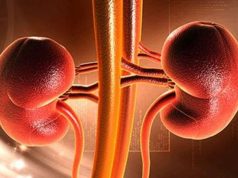Increased risk seen for those with untreated hypertension versus no hypertension; lower risk seen with treated hypertension
By Elana Gotkine HealthDay Reporter
TUESDAY, April 16, 2024 (HealthDay News) — Patients with untreated and new-onset hypertension have an increased risk for newly reported fibroid diagnosis, according to a study published online April 16 in JAMA Network Open.
Susanna D. Mitro, Ph.D., from Kaiser Permanente Northern California in Oakland, and colleagues examined associations of hypertension, antihypertensive treatment, anthropometry, and blood biomarkers with the incidence of reported fibroid diagnosis in midlife using data from the Study of Women’s Health Across the Nation. Participants were enrolled in 1996 to 1997 and followed through 13 semiannual visits from 1998 to 2013. Fibroid diagnosis was reported at each visit.
The researchers found that 20 percent of the 2,570 participants without a history of diagnosed fibroids reported a new fibroid diagnosis during follow-up. Risk varied based on category of hypertension treatment, with an increased risk seen for participants with untreated hypertension versus those with no hypertension (hazard ratio, 1.19; 95 percent confidence interval, 0.91 to 1.57) and a reduced risk for those with treated hypertension (hazard ratio, 0.80; 95 percent confidence interval, 0.56 to 1.15). The risk for newly diagnosed fibroids was lower among eligible participants with hypertension taking antihypertensive treatment (hazard ratio, 0.63; 95 percent confidence interval, 0.38 to 1.05). Participants with new-onset hypertension had an increased risk for newly diagnosed fibroids compared with never-hypertensive patients (hazard ratio, 1.45; 95 percent confidence interval, 0.96 to 2.20). No associations were seen for anthropometric factors or blood biomarkers with fibroid risk.
“Investigation into mechanisms and health implications is warranted; if the associations are causal, antihypertensive medication use where indicated may present an opportunity to prevent clinically apparent fibroid development at this high-risk life stage,” the authors write.
Several authors disclosed ties to the biopharmaceutical industry.
Copyright © 2024 HealthDay. All rights reserved.








